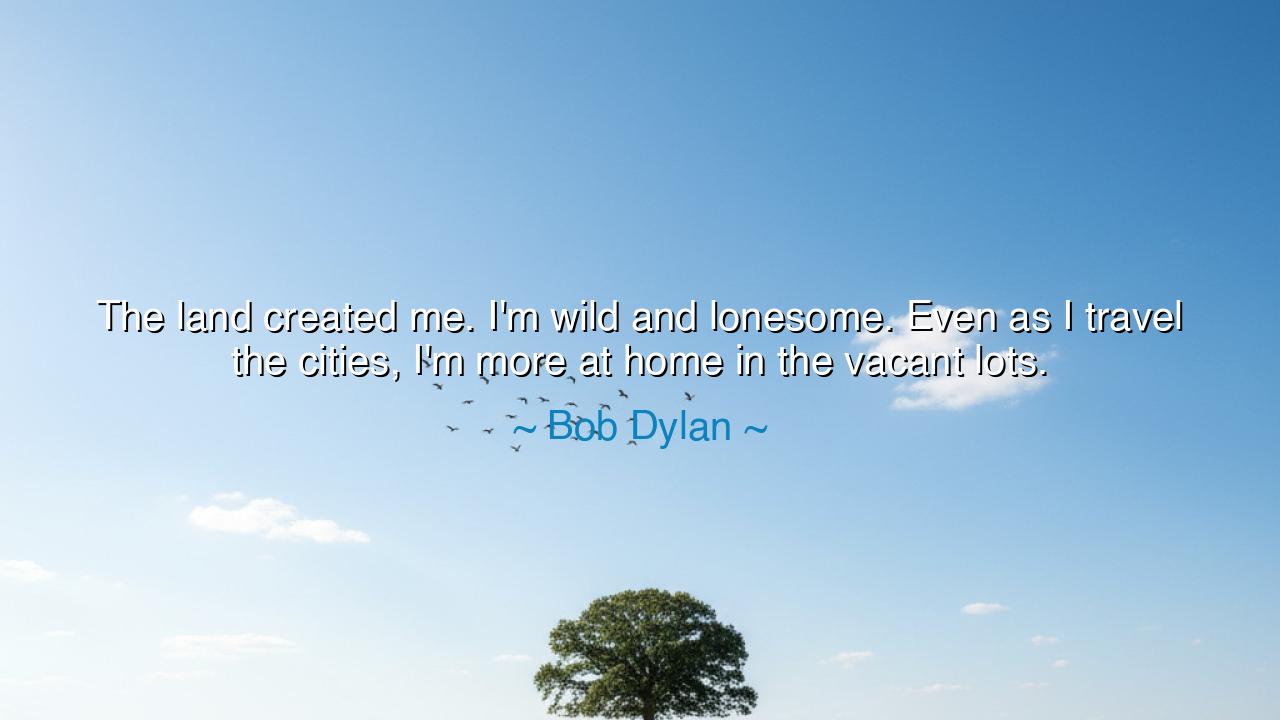
The land created me. I'm wild and lonesome. Even as I travel the
The land created me. I'm wild and lonesome. Even as I travel the cities, I'm more at home in the vacant lots.






The poet and troubadour Bob Dylan once said, “The land created me. I’m wild and lonesome. Even as I travel the cities, I’m more at home in the vacant lots.”
In these words, Dylan reveals not only the heart of an artist, but the eternal struggle of the soul that belongs to both earth and exile. His voice speaks for all wanderers — those who were shaped by the open sky, who find peace not in the polished streets of man but in the quiet breath of untamed places. When he says, “The land created me,” he invokes the ancient truth that we are born not merely of flesh and blood, but of soil, wind, and solitude. The land is not just the ground beneath our feet — it is the first teacher, the first mother, the silent sculptor of our spirit.
The origin of this quote lies in Dylan’s own life — a child of the rugged landscapes of Minnesota, where the fields stretch wide and the horizon hums with wind and distance. Long before fame found him, he was a boy listening to the sound of trains in the night, the whisper of rivers, the sigh of frozen forests. These were his first songs, the raw poetry that later bloomed in his lyrics. Even after he rose to stardom and walked through the great cities of the world — New York, London, Paris — he never ceased to feel that his true self belonged to the wild silence. For Dylan, the “vacant lots” were sacred — they were the remnants of freedom in a world that had paved over the wilderness.
The ancients would have understood this truth deeply. They believed that a man is shaped by his land — that the mountains make the hearts of men bold, the deserts make them enduring, and the forests make them contemplative. To lose touch with the land is to lose touch with one’s essence. Dylan’s words echo this ancient wisdom: he recognizes that no matter how far civilization carries him, the wildness that birthed him still beats within. The “vacant lots” of his cities are not just empty spaces — they are the last whispers of nature amidst the machinery of man, places where the wind still dares to blow free.
In his statement, Dylan also confesses his loneliness — a loneliness not born of isolation, but of belonging too deeply to something that the modern world has forgotten. To be “wild and lonesome” is to walk among people yet remain untamed by their expectations. It is the fate of the artist, the thinker, the wanderer — those whose souls still carry the rhythms of rivers and stars. The land made him not gentle and compliant, but restless and free, unable to fit comfortably within walls and systems. Even surrounded by millions, he finds kinship not in the crowd but in the quiet corners — the vacant lots where weeds grow stubborn and unashamed.
Consider the story of Henry David Thoreau, the philosopher who retreated to Walden Pond to live deliberately, “to front only the essential facts of life.” Like Dylan, Thoreau was born of the land’s simplicity and could not find peace in the noise of cities. He wrote that “the mass of men lead lives of quiet desperation,” enslaved by comfort and routine, forgetting the wisdom of the earth. In nature, he rediscovered truth — that man must remain rooted to something greater than himself, or else he will wither like a tree torn from the ground. Dylan’s “wildness” is the same spirit that moved Thoreau: the refusal to let the soul be tamed by comfort, to remain always in touch with the raw pulse of existence.
Yet there is also a tender humility in Dylan’s words. He does not claim mastery over the land; he claims creation by it. He is not the conqueror of nature, but its child. This humility stands in contrast to the arrogance of modern man, who builds towers and forgets the soil beneath them. Dylan reminds us that all beauty, all creativity, all strength — even all sorrow — flow from our connection to the earth. The land teaches patience, endurance, and honesty. It does not flatter or deceive; it simply is. Those who listen to it learn the language of truth, which no amount of progress can replace.
So, my child of the restless spirit, take this lesson from Dylan’s wild heart: remember where you came from. When the cities overwhelm you, when the noise drowns your thoughts, find your vacant lot — your patch of stillness — and listen to the earth. Walk barefoot on the soil, breathe the wind, sit beneath a tree and remember that you, too, were shaped by the land. Let its silence remind you of who you are beneath the layers of duty and desire. Do not let the world make you forget your wildness, for it is that wildness that keeps your heart alive and your spirit true.
For in the end, as Dylan teaches, home is not built of brick and wood, but of memory, earth, and solitude. The land is the eternal artist, and we are its living art — molded by its vastness, refined by its storms. Even if you roam through cities of stone and light, carry a piece of wilderness within you. Be wild enough to be free, and humble enough to know that all freedom begins where the land first called your name.






AAdministratorAdministrator
Welcome, honored guests. Please leave a comment, we will respond soon